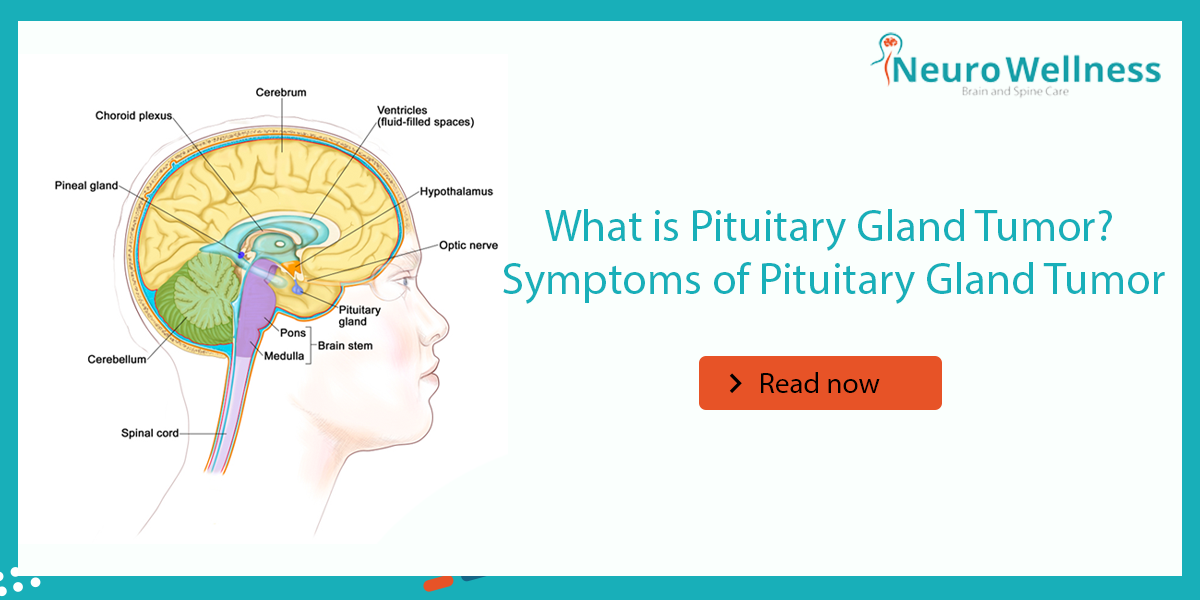The pituitary gland, located at the base of your brain, is no larger than a pea — yet it controls nearly every hormone that keeps your body balanced. It regulates your growth, metabolism, stress, reproduction, and thyroid functions.
When a tumor develops in this gland, even a small one, it can send your body’s hormone system into chaos.
At Neurowellness Bangalore, our neurosurgeons specialize in diagnosing and treating pituitary gland tumors with advanced imaging, endoscopic procedures, and personalized post-surgical rehabilitation programs.
“Most pituitary tumors are benign and completely curable. Early diagnosis helps prevent irreversible vision loss and hormonal damage.”
— Dr. Ganesh Veerabhadraiah, Senior Neurosurgeon, Neurowellness Brain & Spine Clinic
What Is a Pituitary Gland Tumor?
A pituitary gland tumor (pituitary adenoma) is an abnormal growth that forms inside the gland.
Though most are non-cancerous (benign), they can either overproduce hormones or press on nearby brain structures, such as the optic nerve.
| Type of Tumor | Hormone Affected | Common Symptoms | Preferred Treatment |
|---|---|---|---|
| Prolactinoma | Prolactin | Irregular periods, infertility, discharge from breasts | Cabergoline / Bromocriptine |
| GH-Secreting Adenoma | Growth Hormone | Enlargement of hands, feet, facial features | Somatostatin analogues / Surgery |
| ACTH-Secreting Adenoma | Cortisol | Weight gain, high BP, mood changes (Cushing’s Disease) | Surgery + Medication |
| Non-Functional Adenoma | None | Headaches, vision loss | Endoscopic surgery |

Dr. Ganesh Veerabhadraiah
Consultant – Neurosurgeon, Neurointerventional Surgery, Spine Surgeon (Neuro)
23+ Years Experience Overall (17+ years as Neuro Specialist)
Available for Consultation: Jayanagar 9th Block & Kauvery Hospital, Electronic City
Symptoms You Shouldn’t Ignore
Because pituitary tumors can grow silently for years, many patients mistake their symptoms for stress or thyroid imbalance.
Recognizing early signs is key to preventing severe complications.
Common Warning Signs:
1. Frequent headaches or pressure behind the eyes
2. Blurred or double vision
3. Unexplained fatigue or weakness
4. Irregular menstrual cycles or infertility
5. Unusual weight gain or swelling of the face
6. Loss of libido or mood swings
7. Enlargement of hands, feet, or facial bones (acromegaly)
8. Nausea or vomiting from increased brain pressure
If you notice a combination of these symptoms, consult a neurologist or neurosurgeon immediately.
Causes & Risk Factors
While there’s no single cause, medical experts identify several potential risk factors that increase the likelihood of developing pituitary tumors:
• Genetic predisposition – Mutations like MEN1 (Multiple Endocrine Neoplasia Type 1)
• Hormonal overstimulation – Prolonged hormone therapy or stress
• Radiation exposure – Past head or neck treatments
• Head injury or trauma – Can affect glandular tissue
• Chronic steroid use – Disrupts normal pituitary function
According to the Indian Society of Endocrinology (2024), pituitary adenomas make up nearly 15% of all brain tumors in India, with early detection drastically improving outcomes.
How Pituitary Tumors Are Diagnosed
Diagnosis involves a combination of neurological evaluation, endocrinological testing, and imaging.
Step-by-Step Diagnostic Process
1. Physical & Neurological Examination – Initial assessment of vision, reflexes, and hormonal symptoms.
2. MRI Brain with Contrast – Detects tumor size, exact location, and pressure on surrounding tissues.
3. Hormone Blood Panel – Tests for levels of Prolactin, GH, ACTH, and TSH.
4. Visual Field Test – Detects optic nerve compression and peripheral vision loss.
5. Endocrine Consultation – Correlates hormonal imbalance with imaging reports.
At Neurowellness Bangalore, specialists collaborate across neurosurgery, endocrinology, and ophthalmology to create a complete diagnostic picture within days — not weeks.
Treatment Options for Pituitary Gland Tumors
The choice of treatment depends on the tumor’s size, type, and hormone secretion pattern.
1.Medication
For hormone-secreting adenomas like Prolactinomas, medications such as Cabergoline or Bromocriptine often shrink the tumor significantly.
Other hormonal drugs help regulate cortisol or growth hormone levels.
Advantages:
• Non-invasive
• Fewer side effects
• Effective in small or moderate tumors
2.Endoscopic Transnasal Surgery
This minimally invasive “keyhole” surgery allows removal of the tumor through the nostrils using a high-definition endoscope.
It eliminates the need for an external incision and ensures faster recovery.
Benefits:
✅ No visible scar
✅ Shorter hospital stay (2–3 days)
✅ Less pain and faster recovery
✅ Minimal damage to healthy tissue
“Endoscopic surgery has revolutionized brain tumor care. Patients often walk home within three days with full vision and balanced hormones.”
— Dr. Ganesh Veerabhadraiah
3. Microsurgical or Combined Approaches
For larger tumors or recurrences, microsurgical techniques help achieve complete removal while preserving pituitary function.
Sometimes, combined endoscopic + microscopic approaches are used for better precision.
4. Post-Surgery Rehabilitation
After surgery, recovery focuses on hormonal stability and lifestyle management:
• Hormone replacement therapy if needed
• Regular MRI follow-ups every 6–12 months
• Vision therapy for optic nerve recovery
• Physiotherapy to regain strength and energy
Recovery & Lifestyle Modifications
Most patients recover within 2–3 weeks, returning to routine activities shortly after.
Full hormonal recovery may take several months, depending on the tumor type.
Lifestyle Tips for Better Recovery:
• Maintain a balanced diet rich in protein and antioxidants
• Get 7–8 hours of sleep daily
• Manage stress through meditation or yoga
• Avoid smoking, alcohol, and self-prescribed steroids
• Schedule periodic hormone tests as advised by your doctor
Prevention & Long-Term Care
While pituitary tumors can’t always be prevented, early intervention can control their impact.
Preventive Steps:
• Annual health screenings after age 40
• Regular blood sugar, thyroid, and hormone checkups
• Use protective gear during sports to avoid head trauma
• Report vision problems or severe headaches early
• Manage existing endocrine disorders effectively
Prevention starts with awareness. Recognizing early symptoms can save vision, balance hormones, and prevent lifelong dependency on medication.
Consult Our Specialists
Expert Pituitary Tumor Care in Bangalore
The team at Neurowellness Brain & Spine Clinic provides advanced diagnosis and treatment for pituitary adenomas using endoscopic and microsurgical techniques.
FAQs
1. Are pituitary tumors cancerous?
No. Over 90% are benign (non-cancerous) and respond well to medication or surgery.
2. Can pituitary tumors be treated without surgery?
Yes. Many smaller tumors shrink with medication alone, provided they’re detected early.
3. What are the signs that surgery is required?
Persistent headaches, vision loss, or poor hormonal control despite medication.
4. How long does recovery take after surgery?
Most patients return to work within 2–3 weeks and resume full activity in about 2 months.

About Author
Dr. Ganesh Veerabhadraiah
Dr. Ganesh Veerabhadraiah, leading neurosurgeon and neurologist in Bangalore, has over 20 years of expertise in managing back pain, migraines, headaches, neuro disorders, and spine problems. His clinical excellence and patient-first approach make him one of the most trusted neuro doctors in Bangalore.
At Neurowellness Brain & Spine Clinic in Jayanagar and Kavery Hospital Electronic City, Dr. Ganesh provides comprehensive treatments ranging from minimally invasive spine surgery to advanced neurological care. As a respected back pain specialist and migraine doctor, he continues to deliver reliable outcomes for patients.
👉 Connect with Dr. Ganesh on LinkedIn



